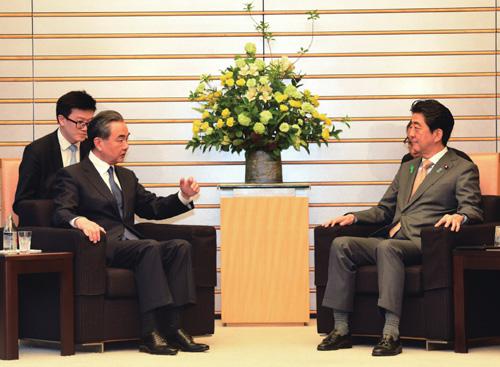Back on Track
2018-05-09ByWenQing
By Wen Qing

Separated by only a two and a half hour fl ight, Beijing and Tokyo are neighbors, but their relations have been anything but neighborly in recent years due to territorial disputes and Japans whitewashing of its past aggressions. Yet with efforts from both sides in recent months, China-Japan relations have seemingly taken a positive turn, culminating in Chinese State Councilor and Foreign Minister Wang Yis recent trip to Tokyo and the resumption of the ChinaJapan High-Level Economic Dialogue after an eight-year hiatus.
According to observers, Wangs visit sent an important message that China-Japan relations are warming up, and thus exchanges between high-level officials could possibly resume.
Wu Jinan, an expert with the Shanghai Institutes for International Studies (SIIS), claimed that in addition to a return visit by Japanese Foreign Minister Taro Kono in January, Wangs visit can be viewed as a further paving of the way for Premier Li Keqiangs visit to Japan.
Sound Sino-Japanese relations are in the interests of both sides, but observers are also realistic as to how far bilateral ties can develop in the future.
Behind positive messages
Sino-Japanese relations deteriorated in 2010 when a Chinese fishing boat collided with Japanese patrol ships near the Diaoyu Islands in the East China Sea, leading to the illegal detainment of the vessels Chinese captain. Diplomatic ties hit a new low in 2012 when the Japanese Government announced plans for the so-called nationalization of the Diaoyu Islands.
Faced with provocation by Japan, China nonetheless put its dissatisfaction aside and sought to maintain good relations with its neighbor, welcoming Japanese efforts to defuse the tensions, Huo Jiangang, an expert with the China Institutes of Contemporary International Relations, told Beijing Review.
Wangs visit has been viewed as the consolidation of a recent positive trend in the diplomatic relationship between the two countries. Since last year, Japanese Prime Minister Shinzo Abe has sought rapprochement with Beijing by expressing interest in the Belt and Road Initiative, attending a ceremony marking Chinas National Day at the Chinese Embassy in Tokyo last September and sending Kono to China in January.
However, according to Huo, Japans efforts toward easing friction with China serve only one purpose—to increase Japans power, which is the primary policy of the Abe administration. The growing capacity of the Chinese market is also clearly a major draw for Japan as a major export-oriented economy.
Despite prophecies of total collapse in the Japanese media, China has shown resilience in economic development and performed well in other areas such as environmental protection and political stability.
According to Huo, with the increasing infl uence of China, the thawing of relations between the two countries is more imperative than ever for the Abe administration.
Economic ties
On April 16, Wang co-chaired the fourth ChinaJapan High-Level Economic Dialogue alongside his Japanese counterpart Kono for the fi rst time in eight years. After the dialogue, Wang told the media at a press conference that representatives from both sides had proposed key areas for China-Japan economic cooperation, including energy conservation and environmental protection, scientific and technological innovation, high-end manufacturing, finance, the sharing economy, and health and social care. They believe that these areas have ample space for cooperation, which will not only benefi t the peoples of the two countries but also provide new impetus for regional development.
Wang also said that “the consensus reached by the two countries is that faced with the rise of protectionism, both sides pledge to take action to safeguard the global free trade system with the World Trade Organization at its core and to work together to build a more open world economy.”
Wu said he believes that there are many new topics in this current round of economic talks such as the transformation and upgrade of industry and how to jointly cope with trade protectionism, reflecting the considerable space for economic cooperation between the two countries.
Economy and trade have long been the most valued exchanges for both countries and served as the stabilizing force during years of turmoil, said Professor Zhou Yongsheng of the China Foreign Affairs University, in an interview with Beijing Review. Zhou noted that such relations become more significant since Abeconomics has failed to have much of an effect in Japan and as the tide of anti-globalization has risen across the world.
According to data released by Chinas Ministry of Commerce, the value of imports and exports between Japan and China was$297.28 billion in 2017, an increase of 9.9 percent from the previous year. Japan exported goods worth $132.86 billion to China, an increase of 16.7 percent, while Chinas imports from Japan reached $164.42 billion, an increase of 5 percent. In the same year 7 million Chinese tourists traveled to Japan, generating over $14 billion for the Japanese economy.
Considering the closeness of the two countries economic and trade ties and the future potential in this area, the strengthening of economic cooperation with China would suit the interests of Japan as other countries step back from globalization, said Zhou.
At the Boao Forum for Asia Annual Conference 2018, Chinese President Xi Jinping announced new measures for expanding Chinas reform and opening up, which will also offer new opportunities for cooperation between China and Japan, Zhou added.
Cautious optimism
The improvement of bilateral ties is particularly significant under current turbulent circumstances and rising trade protectionism from the United States.
However, a cautious optimism should be applied to relations with Japan. As Minister Wang Yi said at the press conference, the future of Sino-Japanese ties hinges on Japans attitude toward Chinas growth and development.
Professor Zhou agreed, adding that Japans mistrust and hostility toward China had previously eroded the foundations of bilateral ties.
Under the pretext of counterbalancing China, Japan has been expanding its military and the development and purchase of weapons in recent years, Zhou said. The deliberate exaggeration of the security threat from North Korea also served this purpose. In fact, in terms of national strength and military power, North Korea is far from being able to rival Japan, and is in reality of very little threat to the country. “The real intention is to deceive people and to justify lavish spending on military development,” Zhou noted.
The Free and Open Indo-Pacifi c Strategy proposed by Abe in 2016 is widely believed to have been designed to contain Chinas rise and counterbalance the Belt and Road Initiative proposed by China in 2013. Since the Indo-Pacific strategy covers large areas which are also included in the Belt and Road Initiative, competition is unavoidable.
China-Japan ties will likely continue to be afflicted by complicated and sensitive historical and territorial issues, which are deep-rooted and diffi cult to solve. According to Zhou, despite the recent warming of bilateral ties, there may yet be bumps in the road ahead. The Abe administration might continue to seek a revision of the“peace clause,” Article 9 of the Constitution, to realize military normalization or even Japans reemergence as a military power. Japan might also repeat the hollow cliché of“Chinas threat” before the revision of the National Defense Program Guidelines, which could take place at the end of this year.
